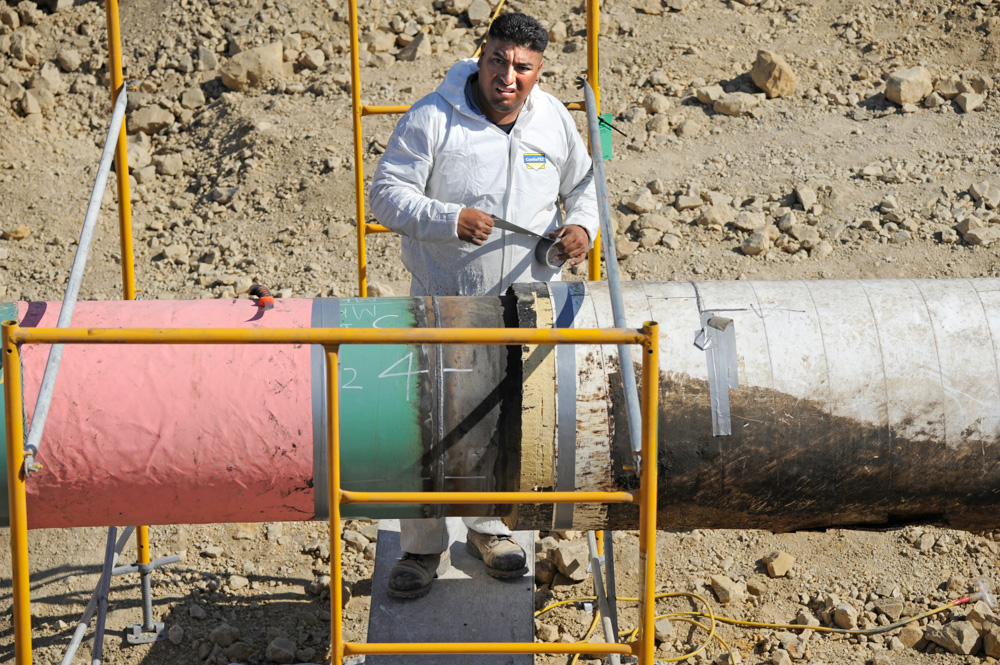Plains Wishy-Washy on Pipeline Replacement?
Commitment Could Be Softened by Ongoing Lawsuit

Plains All American Pipeline gave noticeably mixed signals this week about its plans for the span of pipe along the Gaviota Coast that ruptured in May 2015 and created the Refugio Oil Spill. Publically, the company displayed a full-steam-ahead attitude toward replacing the pipeline, but new court documents described the project with far less certainty.
During three well-attended open house events spread throughout the county, Plains presented in detail its proposal to replace the full length of Line 901, which runs from Las Flores Canyon near Santa Barbara north through Buellton to Sisquoc, as well as Line 903, which connects from Sisquoc to its final delivery point in Kern County. Brightly colored posters and company representatives in dark-gray polo shirts explained how both new lines would shrink in size and dramatically reduce the system’s overall carrying capacity from 300,000 barrels a day to 40,000 to reflect diminishing oil reserves in the Santa Barbara Channel and the impending decommissioning of offshore platforms. Part of Line 901 would be rerouted from under Buellton to around the city’s western edge, the reps said, and it would boast nearly twice as many shutoff valves and two more pumping stations as added safety measures.
Plains submitted its application to the county in April 2018, and the project continues to wind its way through the approval process. At Plains’ Goleta open house on January 31, Steve Greig, director of government affairs, said he expected the company to choose an environmental contractor within the week so public scoping hearings could start later this month. “The hope is we’ll be ready to start construction in the summer of 2021 and start operation in 2022,” he said. Brad Leone, communications director, declined to say whether the spill prompted the replacement plan or if the company had already been considering a reduced capacity system. “It’s hard to respond to ‘what ifs,’” he said. “All we can tell you is it was agreed upon by all parties that the best thing to do would be to move forward with the new pipeline.”
Meanwhile, Plains responded on January 25 to a class-action lawsuit brought by private landowners over pipeline easements by describing its plans to restart the 124 miles of pipelines as “speculative.” The company said it “has made no final decision whether to proceed with replacement,” and while it has submitted an application with the county to do so, the permit is still pending. “Plains could decide not to replace the pipelines and, instead, seek to restart the existing pipelines after making any required repairs, or it could decide to neither replace nor restart them,” the motion said.
The lawsuit itself — filed in December by Santa Barbara attorney Barry Cappello on behalf of the approximately 165 property owners with Plains easements — argues the company’s proposal, which includes a lengthy and intensive construction period, goes above and beyond the scope of the original access contracts. The easements must be renegotiated, the suit claims, and the owners are owed new eminent domain fees as well as damages for lost property values as a result of hosting the ruptured line.
The criminal case against Plains moved forward this week as Judge James Herman denied a motion from the company to set aside its felony conviction over the spill. In his 20-page ruling, Herman said Plains knew its pipeline was vulnerable to external corrosion and possessed underground readings that showed its equipment was in a “dangerously compromised condition.” “[A] pipeline rupture and release of oil was not a matter of if but a matter of when,” he said.
Sentencing is scheduled for April 25. Heavy fines are expected. In its 2017 annual report, Plains estimated costs from the spill, including cleanup, penalties, and legal settlements, could total $355 million. That figure didn’t include lost revenues from the pipeline shutdown. The company, based in Houston with operations throughout the United States, reported $2.2 billion in profits in 2018.



